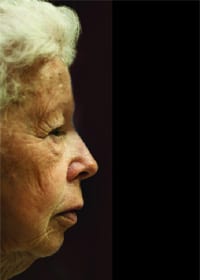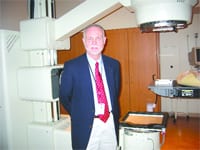At a Loss Dementia Takes Many Forms but So Do Possible Treatments
Dr. Emily Grandey describes a woman — fictional, but plausible — to show just how serious dementia can be, and how it’s not just about memory loss.
“You can have a lady who’s been a saint all her life, who never swore and always got dressed and made up beautifully, even just to go to the Big Y,” said Grandey, who owns and operates the Memory Wellness psychiatry practice in Springfield.
“All of a sudden, this woman starts swearing like a sailor, becomes racist in her remarks, loses her social inhibitions, and becomes lax about dressing. She might become a compulsive gambler when she was always a pennypincher before.”
Such a change is not unheard of when dealing with frontotemporal dementia, one of many types of dementia, a condition that extends well beyond Alzheimer’s disease and basic memory loss.
“Dementia is a more general term,” said Dr. Benjamin Liptzin, chair of Psychiatry at Baystate Health. “It’s a syndrome that’s characterized by memory problems and some other deficits, and it can be caused by a variety of conditions, the most common of which is Alzheimer’s disease.
“But people can have vascular dementia, caused by cerebrovascular disease,” he added. “It can also be caused by Parkinson’s disease, or normal pressure hydrocephalus. A whole variety of conditions can cause dementia.”
“Dementia is just the overall category,” added Dr. William Dean, a neurologist affiliated with Holyoke Medical Center. “It’s like a car — there’s the Toyota name, but there are many specific Toyotas. Dementia is the basic problem with cognitive function, and then you try to separate out the different types. Alzheimer’s is a kind of dementia.”
Therefore, “when someone comes in with a memory disorder, we try to figure out what they may or may not have,” Dean said. “What we try to do as a neurologist is to see if there are any conditions we can treat or reverse.”
Both those goals have become more common as scientists get closer to understanding the causes and effects of Alzheimer’s and other dementias. This month, The Healthcare News examines the many faces of this all-too-familiar, but often misunderstood, condition.
Age of Concern
As our society ages, experts say, the prevalence of dementia rises as well, because it is a condition that predominantly occurs in the second half of life.
Specifically, the frequency of dementia is about 2{06cf2b9696b159f874511d23dbc893eb1ac83014175ed30550cfff22781411e5} among 65- to 69-year-olds, 5{06cf2b9696b159f874511d23dbc893eb1ac83014175ed30550cfff22781411e5} among 75- to 79-year-olds, and more than 20{06cf2b9696b159f874511d23dbc893eb1ac83014175ed30550cfff22781411e5} for 85- to 89-year-olds. After age 90, about one in three people suffer from moderate or severe dementia. About half of all cases are Alzheimer’s disease.
Alzheimer’s, which affects some 5 million Americans, is partly caused by a substance called beta-amyloid, a protein found in every cell of the body, which forms a plaque on the brain cells of the sufferer. In addition, twisted fibers of another protein called ‘tau’ forms inside affected cells. Scientists are not sure what role plaque and tangles play in Alzheimer’s disease, but most believe they somehow block communication among nerve cells and disrupt activities that cells need to survive.
The plaque and tangles tend to form in a predictable pattern in Alzheimer’s sufferers, first affecting areas of the brain that control learning and memory, then branching out from there. “This is what Alois Alzheimer saw under the microscope in 1907,” Grandey said.
Over the past few decades, researchers have come to understand the underlying causes of other dementias as well. For example, vascular dementia occurs when the microscopic blood vessels that supply the brain cells are somehow damaged by chronic high blood pressure, chronic bad cholesterol, or other diseases, such as lupus or multiple sclerosis.
In turn, Grandey said, the brain cells become stressed and diseased. If the injury to the blood vessels continues over time, enough brain cells could die to show up on an MRI.
“People with vascular dementia can become quite irritable,” she said. “They may not have memory problems, but there may be social changes or sleep disorders. There can be impairment in language, dexterity, or visual or special skills. This is determined by where the blood vessels are damaged.” On the other hand, frontotemporal dementias are often characterized by personality shifts, often severe — like in the example of the swearing woman.
Unlike many dementias, particularly Alzheimer’s, frontotemporal dementia can be brought on suddenly, often by some trauma or even a major surgical procedure like a hip replacement. Victims of auto accidents, post-traumatic stress disorder, or multiple concussions are also at risk. “That’s the reason why the NFL Players Association is trying to get better benefits for older players who are now demented,” Grandey said.
“Patients die from these dementias,” she stressed. “They’re lethal. There is no healing from some of these.”
Depending on the cause, some dementias can be reversed, Liptzin said, although there’s not always a cut-and-dry solution. For instance, one type of dementia can be brought on by a vitamin B12 deficiency, so in theory, giving someone B12 shots could make the condition disappear, right? Not so fast.
“If someone has clinically recognized dementia, it’s probably not just due to vitamin B12,” he said. “It’s still worth correcting the B12 deficiency, but that probably won’t reverse the whole dementia.”
Still, Grandey said, it’s important for someone with signs of dementia to see a medical doctor, not just a psychologist or memory specialist, to determine if any underlying medical cause exists. Besides B12 deficiency, possibilities include vitamin D deficiency, hypothyroidism, hyperthyroidism, anemia, and hypoxia, among others. Of course, some medical conditions that can lead to dementia are in themselves irreversible, Liptzin said, citing HIV as a leading cause of dementia among people in their 30s.
“Years ago, before treatments for syphilis, a lot of those people became demented,” Dean added, stressing that, while most people associate dementia with memory loss, it actually manifests in many ways.
“It’s basically an impairment of cognitive function that doesn’t allow you to perform the activities of daily living,” he said. “It might be an inability to do banking, or use a doorknob, or turn the stove off. Some forget what hunger means and don’t eat. Then there are the ones like Alzheimer’s, which are progressive and you can’t reverse, although they’re treatable and can be slowed down with medication.”
Quick Thinking
As with cancer, it’s becoming more important to make an accurate diagnosis as early as possible, especially as new treatments become available.
“It’s absolutely critical to find these patients early,” said Grandey, who has developed a quick memory test with her research partner, neuropsychologist Dr. Mitchell Clionsky. If a patient scores a certain level on the test, he may undergo a series of physical exams to rule out reversible conditions. In fact, among the first 80 patients Grandey saw after launching her practice, only five did not have some underlying condition that contributed to the morbidity of the dementia.
The next step for her patients is a full neuropsychological workup to establish a baseline in about 10 areas of cognitive function, such as attention, language, and organization. Imaging tests, including PT scans of the brain, might follow. “We can determine in what area of the brain the problem is,” she said, a key factor in finding the root cause of the dementia and determining a course of treatment.
One drug currently in the trial stage is meant to act like a vaccination, Grandey said; it’s an antibody that gets infused in the patient and, in theory, attacks and dissolves the amyloid plaque. Other drugs in development keep the rebel amyloid from forming plaque, or increase a sugar in the brain that makes the cells too ‘slippery’ to form plaque.
But rapidly advancing diagnostic tools, like PT and other scans, are just as important, she said. “The different pathologies of the different dementias need to be identified, because the treatment of each one will be different.”
Even non-pharmaceutical interventions can make a difference. “Trials have demonstrated that, if someone exercises 30 to 45 minutes per day, it can actually help them preserve cognitive function,” Grandey said, adding that computer programs have also been developed to help dementia sufferers slow the progression of the condition with a few minutes per day at the screen.
The Alzheimer’s Association has transformed the research into a campaign called Maintain Your Brain, in which older people are encouraged to take part in activities shown to be memory boosters — which may include reading, crosswords, and even dance. Liptzin said there’s a physiological component to exercise as well.
“The evidence shows that all the things we’ve been taught about cardiovascular health — which includes keeping blood pressure under control, keeping cholesterol under control, treating diabetes, and exercising — are all good things for brain health as well,” he explained.
“If you exercise your arm, you make it stronger,” Dean said. “It’s the same with the brain. With Alzheimer’s, you have to exercise the brain, which could stave off a more rapid progression.”
That’s particularly important at a time when doctors can offer no cure.
“The evidence suggests that people on the drugs do better than people on placebos, but they still deteriorate over time,” Liptzin said.
“If we could find early genetic markers and introduce preventive treatments, that would be the ideal, but we’re quite a ways from that,” he continued. “Right now, research is focused on the theories of what causes Alzheimer’s disease, and the pharmaceutical companies are working on a variety of strategies to address those hypothetical causes.”
And, of course, early diagnosis will be key to halting and reversing the progression of a condition that already disrupts and even ends millions of lives each year.
“I saw an 80-something man who had become irritable, angry, even nasty” due to a prolonged bout with dementia, Grandey said. “He got put on the right medication two and a half months ago, and he’s actually a pleasant person to be around.”
If the promising advance of research and treatments continues, it seems that many sufferers of dementia — and their supportive families — will have plenty to be cheerful about.


